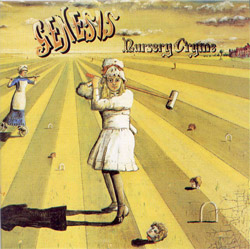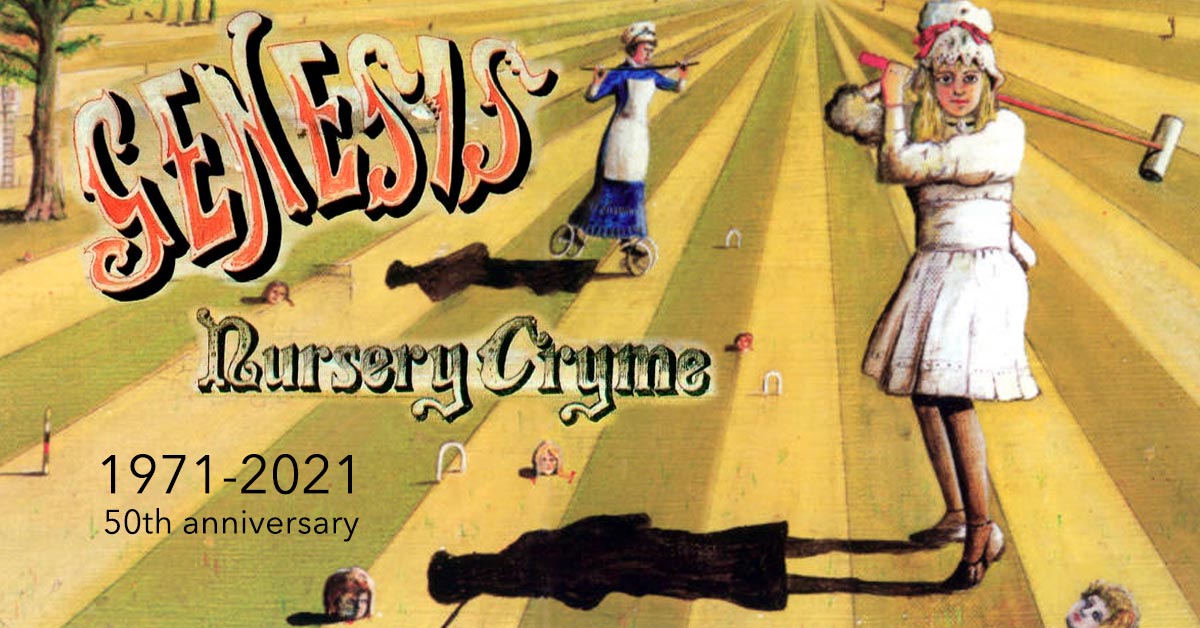- Article
- Read in 5 minutes
Genesis – Nursery Cryme – review
Nursery Cryme was the album that made Genesis a force to reckon with in the progressive rock genre. Despite a lack of success it is considered a classic. We analyze why.
November 1971
November 2021 – Nursery Cryme, the first album of the “classic” line-up (Tony Banks, Phil Collins, Peter Gabriel, Steve Hackett and Mike Rutherford) celebrates its 50th anniversary. The exact release date has been subject to intensive research last year. It was released on 12 November. Read our research article here.
So now more than 50 years have passed. During this time, this album gained more and more fans and its cult status is still very present today. So let’s celebrate this anniversary and look back. The following article about Nursery Cryme was written by Steffen Gerlach in 1999 – it was first published in our German it-magazine #27.
Before they could complete their third album Genesis had to move a couple of rocks out of their way up. Despite losing guitarist Anthony Phillips and drummer John Mayhew the band was self-confident enough to start looking for new musicians instead of splitting up.
One of their ads in Melody Maker was spotted by Phil Collins, a drummer who was looking for a new challenge: “Tony Stratton-Smith requires drummer sensitive to acoustic music and 12-string guitar”. It prompted him to ask for an audition with the band he did not know. Tony Stratton-Smith also told him that the band were looking for a new guitarist, so Phil brought his colleague from his former band Flaming Youth, Ronnie Caryl, to the audition. Phil had the advantage of being able to listen to his contestants, noticed their weaknesses and realized what exactly was wanted from him. His qualities seem to have overshadowed those of the other dozen or so drummers who auditioned, and so he got the job with Genesis. His friend Ronnie Caryl, however, did not – he played just one gig as Genesis guitarist.
It was in this period that an important piece of music was born: “The last song we wrote as a four-piece, was The Musical Box, and it was already quite close to how it ended up on Nursery Cryme, only without the guitar part”, says Tony – obviously that would be difficult without a guitarist. With many gigs to promote Trespass coming up it soon showed that the interim solution of playing as a quartet was not really a long-term option, so they tried out guitarist Mick Barnard. He, too, proved to be just another interim solution. Says Mike: “Somehow it did not work out with Mick. He was good, though, and he got better with time. He toured some six months with us … We had to find someone who was different. We were in contact with, believe it or not, some eighty guys…”
Their search finally ended when they reacted to Steve Hackett’s ad in the Melody Maker. Steve described the first encounter with this colleagues-to-be: “It did not really feel like an audition because Pete and Tony came home to me. I played them a couple of things with my brother. I met them as individuals, played them a couple of songs and the interaction went from there, really.” The rehearsals for the show offered the band time to get used to the new line-up, and after a couple of months on the road they were ready to write the next album. They spent just about the whole summer of 1971 at Luxford House, Tony Stratton-Smith’s place in Crowborough, Surrey.
Mike: “Soon after Steve had joined the band we began writing Nursery Cryme. It was a very difficult album because we all had to adjust to each other. Taking Steve on tour and having him play the songs we wrote as a four-piece was one thing, but filling Ant’s role as a composer was an entirely different thing.” Tony also realized that times had changed: “Nursery Cryme was a difficult album. We had played everything from Trespass live, so we had lots of material to choose from. But except for The Musical Box, which was a live favourite, … we had not really written anything new…”
He also found that the writing process had changed with two new hands aboard: “When someone got excited about something we would react by playing along to it. That was the way we used to work. I think it is okay to say that Steve and Phil did not really feel up to that, particularly in the early days. They were the new boys, after all, while the three of us were something of a clique.” Peter noticed that, too: “We found it difficult to give up some of our territory… Steve was the first who started to assert himself and bring in songs. Some of them we liked, many we did not. I think this was partly because Steve was less able to manipulate the rest of the band than us.”
Steve described the new situation in the Genesis collective: “The difference was – before we had always been good mates in a band, but we were not necessarily friends but rather colleagues. We were a team, and we went through many exhausting moments which frequently made me wonder whether I was up to the job.” It was the first time that he would have influence and some sort of control over an album. Because of the readjustments Nursery Cryme was one of the albums the band found far more difficult to write than the others – and more controversial to boot. The lyrics grow richer, humour is far more important than on the previous album, but musically the band had not broken new ground since Trespass, despite two fifths of the band being new. It seems that their label Charisma thought the same.
They were supposed to release the album. Says Tony: “I think one of the most depressing things about Nursery Cryme was the lack of feedback from the record company. They did not seem to really like it. Looking back I would say it is my least favourite album, and only The Musical Box and Fountain Of Salmacis make up for it as far as I am concerned.”

Phil, who was probably the musician with the most experience in arranging things offers a similar view: “Nursery Cryme is not one of my favourites. It sounds as if everone were playing the keyboards with both hands. There are fat chords, two guitars and a really big drum sound. Peter’s voice was big, too, and all in all it sounded it all those big things had been squeezed onto this small bit of tape.”
Mike also compares it to the later album Selling England By The Pound: “… there were a couple of very strong highlights, but also some weaker songs.” The album – its title is actually a pun on “nursery rhyme” and “crime” –, like its predecessor, was recorded and produced in Trident studios, London, by John Anthony and released among little promotion in November ’71. Their hope to achieve their breakthrough with this record was small, and so they focused on increasing their fan community by playing live gigs. Soon, however, good news would unexpectedly reach the band…
by Steffen Gerlach
translated by Martin Klinkhardt
Your favorite tracks on Nursery Cryme? Vote here.

